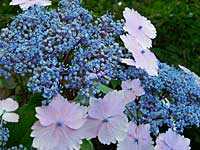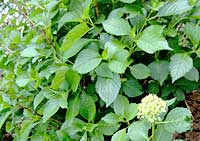



 |
The name of the diuretic herb, hydrangea, is appropriately derived from the Greek word meaning water vessel. Hydrangea is indigenous to North America, particularly the southern and midwestern areas of the United States. The Cherokee Indians used this amazing herb to expel kidney and bladder stones, introducing it to the early settlers.
The hydrangea root, collected in the autumn, produces most of the plant’s health benefits, although the bark was also used by the Cherokees for wounds, burns, sore muscles and sprains.
Because of its diuretic qualities, hydrangea increases the flow of urine, which makes it particularly effective in cleansing the urinary tract, including kidneys, bladder, prostate and urethra. An anti-lithic herb, it prevents stones from forming in the kidney and bladder, and assists the body in removing stones and gravel that have already formed in these organs. It reduces swelling in inflamed, enlarged prostrates in men, particularly when combined with horsetail.
|